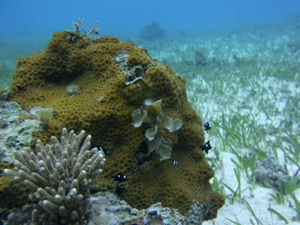Urgent Statement on the coward submission of the Environmental Impact Assessment report of Henoko
We, The Nature Conservation Society of Japan (NACS-J) strongly denounce the action taken by the government against the Aichi Target for biological diversity conservation that Japan has once world-widely promised to stick to.
The environmental impact assessment report prepared by the Ministry of Defense has been submitted in a sneaking manner to the Okinawa prefecture today knowing that many local residents express their string opposition. This is a totally unacceptable action by the government. It would never gain social recognition and should bring about stronger resentment. What has happened today in Okinawa is far from the spirit of the environmental impact assessment law which aims at ”contributing to secure people’s healthy and cultural live for the present and future”.

The environmental impact assessment process adopted by the government was purposely sloppy. Construction of two runways and the other facilities should inevitably cause environmental destruction around Henoko and Oura-bay area which are known to be biodiversity rich. As the host nation of COP10 (Conference of the Parties) meeting of Convention of Biological Diversity held in Japan last year), the government must move toward “the effective and urgent action to halt the loss of biodiversity”. Their course of action must be internationally blamed.
Many researchers and environmental NGOs have pointed out that the survey report of the Ministry of Defense does not pay much attention to the biological conservation, despite the fact that an enormous amount of budget has been spent to collect information and perform investigation for preparing the thick environmental assessment report (7,000 pages long). The report does not acknowledge the value of biodiversity rich marine areas of Henoko and Oura-bay as well as the endangered status of dugong. The scientific aspects of the observed results must be discussed in more detail. The report simply concludes that the impact against the environment must be limited so that the construction of runways and the landfill could be safely proceeded. The political situation of Japanese government is firmly reflected therein. The process adopted by the government even conflicts with the domestic laws and codes.
NACS-J will examine the contents of the report in detail, making the concealed issues widely known to the public. We would like to emphasize the importance of the Henoko and Oura-bay area for biological conservation and will continue to ask our government not to reclaim the land of Nago.
December 28, 2011
The Nature Conservation Society of Japan
Contact;
Director, Conservation Project Division, NACS-J
Masato Ohno
Marine officer, Conservation Project Division, NACS-J
Mariko Abe (Dr)


